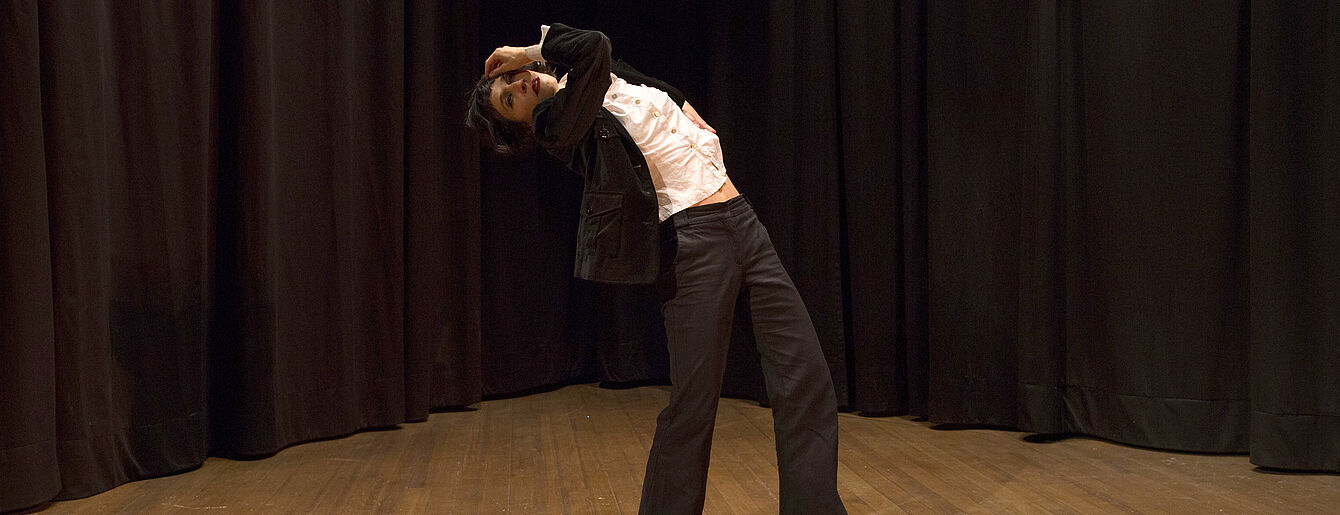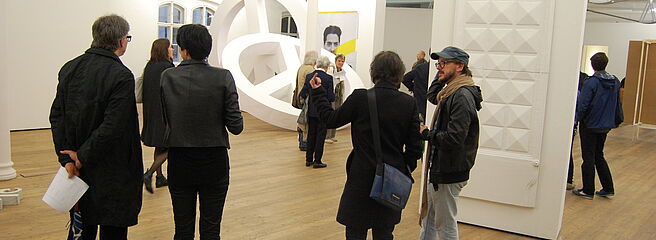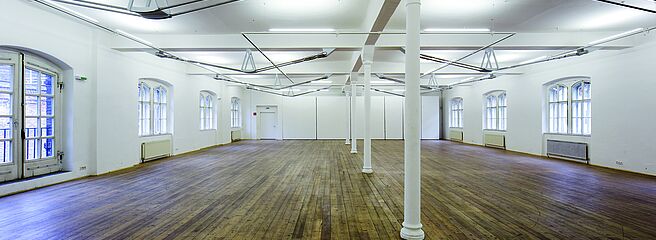
July 3 – July 19, 2019
Kunsthalle Exnergasse
... the vast land from which she comes.
Behind the boy, however, the night passes silently and spreads the black cloak of forgetfulness over the vast land from which he comes.
Maxim Gorky, Musik der Großstadt
Isa Rosenberger’s work often re-contextualizes, challenges, and questions history with the current realities of the present. This precarious approach enables recognition of different perspectives and possibilities by also vocalizing muted, suppressed, and forgotten histories.
In 1934 the theatre stage of the Volksheim Ottakring in Vienna presented Gertrud Kraus’s* dance play “Die Stadt wartet” (The City Waits),** which was based on Maxim Gorky’s fairy tale “Musik der Großstadt”(The Music of the Big City). Her choreography reflected the way of a youth into the city and both the fear and the fascination of discovering and living in a big city as a young boy—Gertrud Kraus herself danced the role of the boy. “Interested in socio-political conditions and increasingly under pressure because of her Jewish heritage, she was one of the few exponents of expressive dance to develop art forms and choreographies that demonstrated political engagement. “ (Andrea Amort***)
However, as a historical lapse, there is no visual document capturing the performance of the dance play “The City waits” at Volksheim Ottakring . The project is an attempt to reflect on this lapse.
Rosenberger collaborates with the artist and dancer Loulou Omer, whose mother Zipora Lerman was a student of Gertrud Kraus in Tel Aviv.
The Volksheim Ottakring, founded in 1901, was of great cultural and political importance, especially in the interwar period.**** Adult education centres of that time were places for alternative education and knowledge transfer; they played a central role in the popularisation of avant-garde art and culture beyond the bourgeois salons with the motto “Knowledge for all”. Today, it is called the Volkshochschule Ottakring (VHS Ottakring – Ottakring Adult Education Centre): The VHS continues to serve as a centre for further education for people with diverse qualifications and backgrounds, offering various types of courses and programmes.
Taking Gertrud Kraus’s dance play “Die Stadt wartet” as a starting point, Isa Rosenberger’s project investigates how the forgotten social reform history of the VHS Ottakring and the associated history of (politically engaged) expressive dance in Austria can be recalled, revisited, and contextualised with the urgencies of our present day. Following the interdisciplinary working methodology of Kraus, the project unfolds the discipline of dance as a specific poetic space in which art forms, times, and images can be mixed with new and cross-references.
Rosenberger also conducted a workshop with young people at the VHS Ottakring in which she applied Kraus’s approach.
Not only the workshop but also Rosenberger’s extensive research on Gertrud Kraus, which takes place both in Vienna and Tel Aviv, reflect an inquiry into geographical movements and a migration of thoughts that follow spiral routes across countries: for example, the migration of expressionist dance from Austria and Central Europe to Israel; or the migration routes of the students of the workshops from the Middle East to Austria.
The exhibition is visually oriented upon the idea of the “stage” as the focal point of the political and the social. Hence, the exhibition is composed of stages putting the various components of the project into play: photos, video, archive materials, workshop results, sketches, and performances.
Special thanks to: Loulou Omer, Andrea Amort, Petra Amster und Thomas Laimer / Volkshochschule Ottakring, Susanne Kompast, Ruth Eshel, Christian H. Stifter, Österreichisches Volkshochschularchiv, Irit Rogoff, Liora Malka Yellin, Wendpanga Marie Balbone, Karolin Kahraman, Ilie Vlah, Albin Bunjaku, Alzuabi Loai, Abib Faye, Javed Sobhani, Relli De Vries, Lisl Ponger, Victoria Khodorkovsky / Israeli Dance Archive, Elke Krasny, Reinhard Mayr, Michael Zinganel, Musikverlag Döblinger
Isa Rosenberger graduated from the University of Applied Arts Vienna and completed postgraduate studies at the Jan van Eyck Academy in Maastricht. Since 1999 she has held several teaching positions, including at the Academy of Fine Arts Vienna and at the Vienna University of Technology.
Her exhibitions include Crosssections Triology, Kunsthalle Exnergasse; Generali Foundation: 30 Years. In Dialog with 1918 1938 1968, Museum der Moderne Salzburg (2018); Specular Windows. Reflections on the Self and the Wider World, Belvedere 21, Vienna; Up into the Unknown, Kunsthaus Graz (2017); Bergen Assembly, Bergen; Anti: Modern, Museum der Moderne Salzburg; Putting Rehearsals to the Test, VOX, centre de l’image contemporaine, Montreal; Archives and Power II, Museum of Contemporary Art Vojvodina, Novi Sad (2016); Hotel Metropole. Der Erinnerung eine Zukunft geben. Into The City I Wiener Festwochen 2015; Creating Common Good, Kunst Haus Wien (2015); Lenin: Icebreaker, LENTOS Kunstmuseum Linz (2014); It’s The Political Economy, Stupid, Pori Art Museum, Pori and Gallery 400 - University of Illinois at Chicago; Lenin: Icebreaker, Murmansk, the 5th Moscow Biennale of Contemporary Art (2013); Espiral, Grazer Kunstverein (solo) (2011); Nový Most, Edith Russ Site for Media Art, Oldenburg (solo)(2009); Nový Most, Secession, Vienna (solo)(2008). In 2008 she has received the 28th Otto Mauer Prize and in 2012 an Outstanding Artist Award for Video and Media Arts.
She lives and works in Vienna.
---------
*Gertrud Kraus (1901 Vienna – 1977 Tel Aviv) was one of the central figures of expressive dance—above all, a strongly female art form—in Vienna and pursued a successful career as a solo dancer and choreographer since 1924. Kraus emigrated to Tel Aviv in 1935. There she founded the Israel Ballet Theatre in 1950/1951 and was the first director of the dance department of the Rubin Academy of Music & Dance in Jerusalem.
**The work consists of nine pieces of music composed by Marcel Rubin: The Boy on the Way to the City, The Choir of the Suffering City, Dawn, Enlightenment, Amusement, The Unfinished City, The Dream of Happiness, The Boy Among People, and Expectation. Connecting words by Elias Canetti. The premiere of the dance play was in Vienna in 1933.
*** Quoted from Andrea Amort (ed.): Everybody dances. The Cosmos of Viennese Dance Modernism, Hatje Cantz Verlag, Berlin 2019, S. 338 f.
****Important protagonists of Viennese modernism, such as Ernst Mach, Adolf Loos, Josef Hoffmann, Rosa Mayreder, Marianne Hainisch, Elise Richter, Lise Meitner, Eugenie Schwarzwald, Otto Neurath, Alfred Adler, Robert Musil, Hermann Broch, Jean Amery, but also dancers like Gertrud Bodenwieser, Rosalia Chladek, and Gertrud Kraus, held lectures, gave courses, or danced and played on the stage of the VHS Ottakring. The stage where Gertrud Kraus danced still exists today.
Curated by Basak Senova
In the framework of the CrossSections project
Supported by Federal Chancellery Republic of Austria



